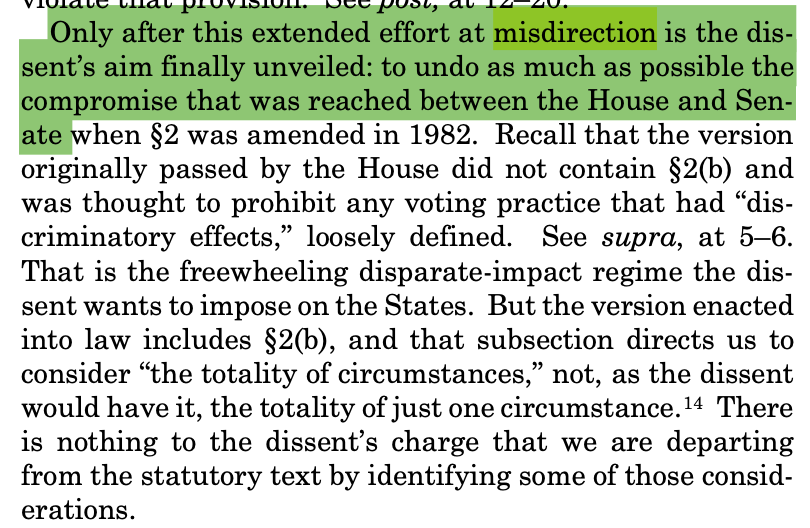
⬇️ Good thread on Supreme Court's decision in the VRA case.
My question: why "death by thousand cuts," not sledgehammer?
My answer: Alito and Kagan are writing for Congress. The old Roberts-Stevens-Kennedy coalition from Crawford is gone, w/ no successor in sight. 1/9
My question: why "death by thousand cuts," not sledgehammer?
My answer: Alito and Kagan are writing for Congress. The old Roberts-Stevens-Kennedy coalition from Crawford is gone, w/ no successor in sight. 1/9
https://twitter.com/ProfGuyCharles/status/1410623819287564306
There's now no sense that any Republican on the Court can trust, compromise with, or even respect a Democratic justice in voting rights cases, or vice versa. 2/9
Alito calls the heart of Kagan's disent an exercise in "misdirection," essentially a ruse to distract attention from her "radical project" of unraveling Congress's compromise. 4/9 



Yet even as he ridicules his colleague, Alito stresses that he's not gutting s. 2 or dissing Congress. He's just expounding reasonable, common-sense "factors" for courts to apply in s. 2 cases.
What he's really doing is feeding talking points to Republican Senators... 5/9
What he's really doing is feeding talking points to Republican Senators... 5/9
... who will repeat them ad infinitum in defending the filibuster and the lack of any need to update the VRA, still "good as it was in '82" 6/9
For her part, Kagan makes some strong points about the law (especially how s. 2 responds to the needs Native Americans on remote reservations, for whom "usual" voting requirements create unusual burdens). But... 7/9
the core of her dissent (the "misdirection") is really a history and a plea--a plea that Congress, at this "perilous moment for the Nation's commitment to equal citizenship," renew and revivify the VRA. 8/9 

The plea is not only for Congress to fix the majority's gloss on s. 2, but, more centrally, to restore the preclearance regime that Shelby County "rashly" terminated.
Which would make enforcement of voting rights much less dependent on the colleagues she disdains. 9/9

Which would make enforcement of voting rights much less dependent on the colleagues she disdains. 9/9


• • •
Missing some Tweet in this thread? You can try to
force a refresh






